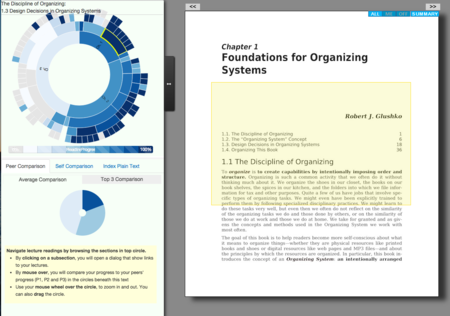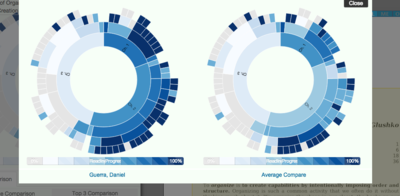Engaging Students in Online Reading Through Social Progress Visualization
Contents
Project Summary
Almost every college course expects students to complete weekly readings from course textbooks or other kinds of course materials. Knowledge to be acquired during weekly reading assignment is critical for students’ course success. Yet, it is not easy for an instructor to assure that the student completed the assigned readings. Reading assignments produce no artifacts to grade. As a result, the students frequently have insufficient motivation to complete the reading assignments. This project explores an alternative approach to encourage student reading using a social progress visualization interface.
- student online reading process is tracked on the level of individual sections
- student reading progress is visualized on several levels – from chapters to sections to subsections – and presented to the student
- students are offered an interface to compare their reading progress with both, the progress of the class as a whole and the progress of individual peers
Demo
You can demo the first two versions of Reading Circle, from version 1 and from version 2.
Funding
The project is funded by University of Pittsburgh Council on Instructional Excellence in 2012.
Keywords
ReadingCircle, Social Comparison, Open Social Student Modeling, OSSM, Social Navigation, Online Reading, Electronic Textbook
Systems
More information
- Watch [video
- Read Times article
Contacts
Publications
Guerra, J., Parra, D., and Brusilovsky, P. (2013) Encouraging Online Student Reading with Visualization. In: Proceedings of 2nd Workshop on Intelligent Support for Learning in Groups at the 16th Annual Conference on Artificial Intelligence in Education, AIED 2013, Memphis, TN, USA [1]


